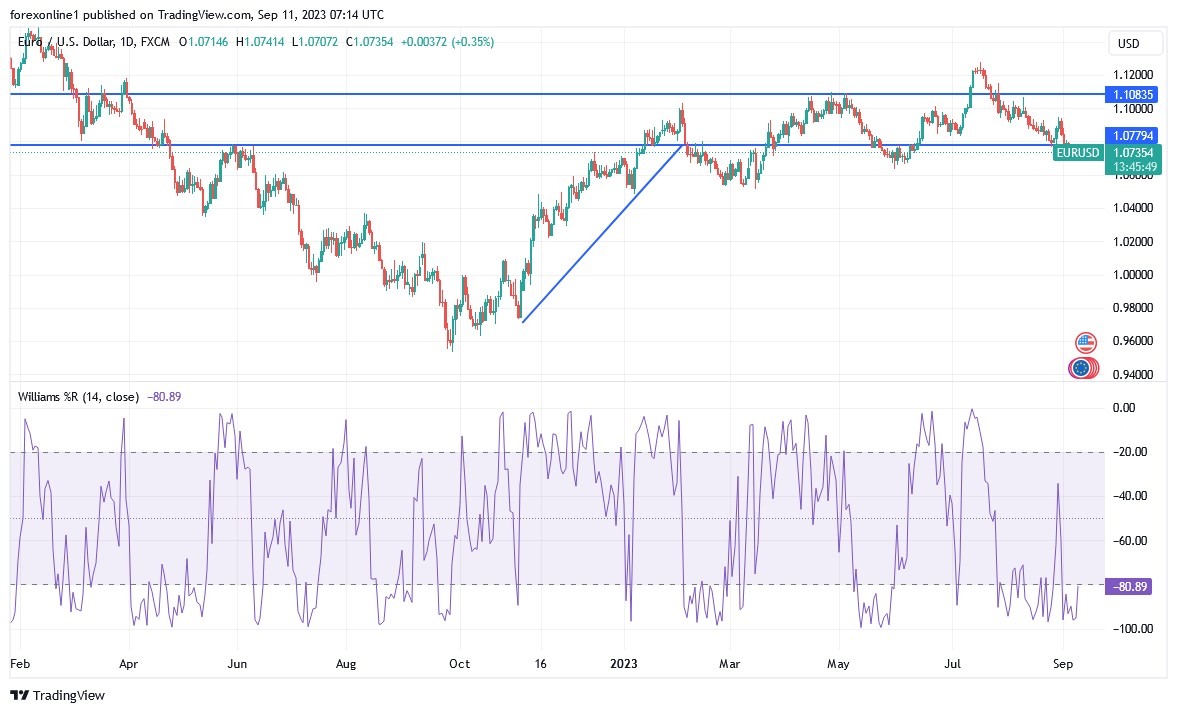During last week's trades, the bear's control over the direction of the price of the EUR/USD currency pair increased as it fell to the lowest support level of 1.0686 in three months and closed the week's trades stable around the 1.0700 level. The performance came under the strength of the US dollar, supported by the continued tightening of the US central bank's policy, and the results of the latest US economic data confirm that the US economy is far from recession despite the US Federal Reserve's policy.
Top Forex Brokers
Financial markets see a less than 50% chance of an interest rate hike by the European Central Bank this week, an expectation that has helped somewhat to ease recent weakness in the euro. But economists at ING Bank expect interest rates to be raised again in September, a move that could boost the euro given current market expectations that interest rates will remain unchanged. The bank's analysts admit the uncertainty that surrounds the decision given the conflicting messages coming from the economy: on the one hand, inflation is still very high but on the other hand, it is clear that economic activity is slowing down sharply. The European Central Bank may also be inclined to allow the effect of raising interest rates by 425 basis points and make its effect felt.
But overall inflation remains too high for the now strictly data-driven central bank, and the recent rise in oil prices may prompt ECB economists to raise inflation expectations again. At the same time, wage growth in the Eurozone also reaches 5.0%, which corresponds to the constant inflation levels feared by the European Central Bank.
ING Bank generally expects interest rates to rise again, although they expect the European Central Bank will also be keen to avoid calling it the final step, which could boost interest rate cut expectations and ultimately undermine the impact of the hike.
Economic Outlook
Inflation in Germany slowed slightly in August as expected, but the rate remained high due to increases in energy and food prices, final data from statistics agency Destatis showed on Friday. Consumer price inflation slowed to 6.1 percent in August from 6.2 percent in July. The Bureau of Statistics confirmed the provisional estimate published on August 30. Commenting on the numbers, Ruth Brand, head of the Bureau of Statistics, said that "the increases in energy and food prices exceed overall inflation and keep the inflation rate high." She added by saying: "The primary effect caused by the nine-euro ticket last year was also clear in August, when it led to a rise in inflation and reduced the inhibitory effect of the German ticket on prices." And the primary effect will cease to apply as of the following month.
Excluding energy and food, German core inflation stabilized at 5.5 percent in August. Food prices rose 9.0 percent from August 2022, but this was weaker than the 11.0 percent increase recorded in July. At the same time, the pace of the annual increase in energy prices accelerated to 8.3% compared to 5.7% in the previous month.
Expectations of the euro against the dollar today:
- I expect the downward momentum of the EUR/USD currency pair to continue until the reaction of the markets and investors to the policy decisions of the European Central Bank later this week.
- The closest targets of the bears for the current trend are the support levels 1.0645, 1.0580 and 1.0490 respectively.
- The purchase will be ideal from the second and last level.
- This is taking into account that the recent losses moved the technical indicators towards strong selling saturation levels but the factors of the dollar's strength are in effect.
According to the performance on today's chart below, there will not be a first break in the general downward trend without a movement of the euro/dollar pair towards the resistance levels 1.0860 and 1.1000 respectively. Today the economic notebook is devoid of the important and influential editions.
Ready to trade our Forex daily analysis and predictions? Here are the best regulated trading brokers to choose from.

